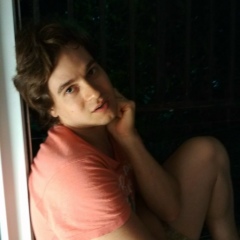Эволюция cубъекта в лирике к песням. В ранних альбомах - "we", в предпоследних трех - "you", а в последнем - "he".
Начиналось с общности и попыток осознать ситуацию, затем был период убедить, а вот теперь - взгляд со стороны.
В принципе, это ровно три этапа в развитии любого человека.
Сначала человек пытается понять что вообще вокруг происходит - этот период называется детством, где личность еще не настолько выделяется из общности ее окружающей, и поэтому маленький человек вопрошает к окружающим, при этом ощущая себя частью их общего мира.
(Некоторые на этом этапе застревают на всю жизнь, к сожалению, и так и остаются растерянными и вопрошающими, хотя спрашивать-то не у кого, или еще хуже - обязательно найдется хитрый отвечающий в свою пользу.)
Потом когда человек начинает что-то узнавать, он начинает пытаться донести свою точку зрения и отстоять ее - это молодость - личность пытается выделиться и защитить свое мировоззрение, потому что оказывается, что этот мир другой, и вокруг куча имеющих другое мнение.
(Некоторые застревают и тут, и всю жизнь пытаются кому-то что-то доказать, хотя доказывать особо некому. Все кому пытались доказать, уже выстроили свою жизнь, и им в принципе все равно, а остальным и подавно нет дела.)
А зрелый человек больше наблюдает и делает выводы. Ему уже не обязательно чувствовать себя частью чего-то, он и сам по себе хорошо живет. И ему уже не надо кому-то что-то доказывать. Он просто знает свою цену и свое место в жизни, и любит взгляд со стороны на любую точку зрения, даже на свою собственную.
Начиналось с общности и попыток осознать ситуацию, затем был период убедить, а вот теперь - взгляд со стороны.
В принципе, это ровно три этапа в развитии любого человека.
Сначала человек пытается понять что вообще вокруг происходит - этот период называется детством, где личность еще не настолько выделяется из общности ее окружающей, и поэтому маленький человек вопрошает к окружающим, при этом ощущая себя частью их общего мира.
(Некоторые на этом этапе застревают на всю жизнь, к сожалению, и так и остаются растерянными и вопрошающими, хотя спрашивать-то не у кого, или еще хуже - обязательно найдется хитрый отвечающий в свою пользу.)
Потом когда человек начинает что-то узнавать, он начинает пытаться донести свою точку зрения и отстоять ее - это молодость - личность пытается выделиться и защитить свое мировоззрение, потому что оказывается, что этот мир другой, и вокруг куча имеющих другое мнение.
(Некоторые застревают и тут, и всю жизнь пытаются кому-то что-то доказать, хотя доказывать особо некому. Все кому пытались доказать, уже выстроили свою жизнь, и им в принципе все равно, а остальным и подавно нет дела.)
А зрелый человек больше наблюдает и делает выводы. Ему уже не обязательно чувствовать себя частью чего-то, он и сам по себе хорошо живет. И ему уже не надо кому-то что-то доказывать. Он просто знает свою цену и свое место в жизни, и любит взгляд со стороны на любую точку зрения, даже на свою собственную.
The evolution of the subject in the lyrics to the songs. In the early albums - "we", in the penultimate three - "you", and in the last - "he".
It began with community and attempts to grasp the situation, then there was a period to convince, and now - a look from the outside.
In principle, this is exactly three stages in the development of any person.
At first, a person tries to understand what is happening around - this period is called childhood, where a person is not so much distinguished from the community around it, and therefore a small person asks to others, while feeling himself a part of their common world.
(Some at this stage are stuck for life, unfortunately, and so remain confused and questioning, although there is no one to ask anyone, or even worse - there will definitely be a cunning answer in his favor.)
Then when a person begins to learn something, he begins to try to convey his point of view and defend it - this is youth - the person is trying to stand out and defend his world view, because it turns out that this world is different and there are a lot of different opinions around.
(Some people get stuck here, and all their life they are trying to prove something to someone, although there is no one to prove especially. Everyone tried to prove it, they have already built their lives, and they don’t care, in principle, and the rest don't care.)
A mature man observes more and makes conclusions. He no longer needs to feel part of something, he himself lives well. And he no longer needs someone to prove something. He just knows his price and his place in life, and loves the view from the side at any point of view, even at his own.
It began with community and attempts to grasp the situation, then there was a period to convince, and now - a look from the outside.
In principle, this is exactly three stages in the development of any person.
At first, a person tries to understand what is happening around - this period is called childhood, where a person is not so much distinguished from the community around it, and therefore a small person asks to others, while feeling himself a part of their common world.
(Some at this stage are stuck for life, unfortunately, and so remain confused and questioning, although there is no one to ask anyone, or even worse - there will definitely be a cunning answer in his favor.)
Then when a person begins to learn something, he begins to try to convey his point of view and defend it - this is youth - the person is trying to stand out and defend his world view, because it turns out that this world is different and there are a lot of different opinions around.
(Some people get stuck here, and all their life they are trying to prove something to someone, although there is no one to prove especially. Everyone tried to prove it, they have already built their lives, and they don’t care, in principle, and the rest don't care.)
A mature man observes more and makes conclusions. He no longer needs to feel part of something, he himself lives well. And he no longer needs someone to prove something. He just knows his price and his place in life, and loves the view from the side at any point of view, even at his own.
У записи 1 лайков,
0 репостов,
98 просмотров.
0 репостов,
98 просмотров.
Эту запись оставил(а) на своей стене Антон Лобов





















